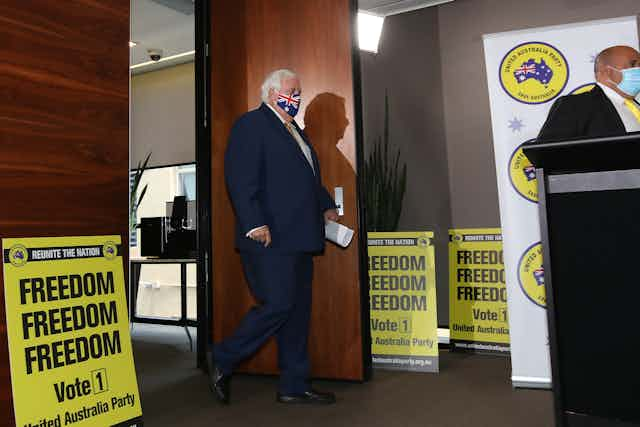With just two months to go before a federal election is due, we are being bombarded by broadcast ads and yellow billboards around Australia. Funded by Clive Palmer and endorsing his United Australia Party (UAP), they carry a simple message: FREEDOM FREEDOM FREEDOM.
Commentators have talked about the potential demographic these ads are designed to attract, and the relationship of the messaging and Palmer to the anti-vax movement, “freedom rallies” and convoys.
Then there is the extraordinary amount of money spent on the ads: Palmer has spent more than $31 million since August 2021 on political attack advertising for the UAP. His spending dwarfs the outlay of the major parties by a hundred-fold. He has promised to run the most expensive election campaign in the nation’s history, based on “freedom”.
Read more: Is it curtains for Clive? What COVID means for populism in Australia
We should not underestimate the power of freedom messaging. As a society, we have experienced unprecedented constraints on normal freedoms over the past two years. Regardless of any justification for relevant restrictions, a visceral backlash from a significant number of people should not be surprising.
In late July 2021, we conducted a human rights survey of 1,000 people in Queensland. The following question, which was not mandatory, garnered about 800 valid responses: What are the human rights that are most important to you?
While issues relating to equality and discrimination attracted the most responses, the combined total for “freedom of speech” and “freedom” generally was 28.7%. If we add “freedom from vaccines”, that goes up to 29.9%.
While many have dismissed the “freedom protests” across Australia as fringe movements, this survey indicates that nearly 30% of those who responded to this question felt “freedom” of some sort to be the most important human right. And this was in Queensland, which did not have the same experience of lockdowns as Victoria and New South Wales.
“Freedom” tends to denote a preference for government non-interference. But the responses regarding vulnerability and safety (which a combined 12.3% listed as their top priority human rights issues, and, arguably, economic social and cultural rights and equality/discrimination, for a combined 31.97%), tend to favour greater government intervention and action.
There were divergent views on this question among different demographics. For example, men were significantly more concerned than women about freedom of speech (19.6% compared to 13.7%) and civil and political rights (20% compared to 12.2%).
The oldest respondents were those most likely to choose “freedom”, and especially “freedom of speech”. First Nations respondents were much more likely to choose economic social and cultural rights (19% compared to 12.6%), and less than one-third as likely to choose civil and political rights (4.8% compared to 15.6%).
We found the higher the respondents’ level of education, the less concerned they were with equality and discrimination, while concern with civil and political rights increased. As a final example, concerns about “freedom of speech” and “freedom” were much higher among lower-to-middle-income groups compared to wealthier respondents.
The demographic differences are not easy to interpret. The results might indicate the groups that are traditionally more vulnerable to rights abuses (for example, women, First Nations people, the less educated) are more likely to prioritise rights that seem to require proactive government.
However, the results are not entirely in keeping with this observation. Concerns over freedom were more apparent among lower-income groups compared to higher-income groups, and among older Queenslanders.
What it clearly tells us, though, is that it is vitally important to reclaim the word “freedom” as a human rights concept. The political conversation this year needs to remind people that “freedom” is important, but other concepts also inform human rights. These are, notably, equality, fraternity and dignity: freedom is not absolute.
“Freedom to” and “freedom from” are rights that must be balanced against one another: for example, the right to make religious statements and the rights of trans children to an education.
Government non-interference might, for example, seem desirable to many when it comes to personal choices. But it is certainly undesirable when, for example, people need help recovering from floods or in gaining access to medical treatment.
Opponents of the UAP should avoid anti-freedom messaging. They should focus instead on reclaiming the word freedom as an emancipatory ideal that is a core component of human rights, but not the only one.

